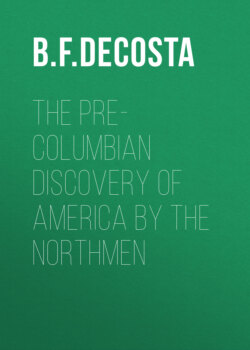Читать книгу The Pre-Columbian Discovery of America by the Northmen - B. F. DeCosta - Страница 19
На сайте Литреса книга снята с продажи.
LOST GREENLAND FOUND.
ОглавлениеBut, whatever may be the value of the preceding extract, it is clear that Greenland was never wholly forgotten. The first person who proposed to reopen communication was Eric Walkendorf, Archbishop of Drontheim, who familiarized himself with the subject, and made every preparation necessary in order to reestablish the colony; but, having fallen under the displeasure of King Christian II, he left the country and went to Rome, where he died in the year 1521. Thus his plans came to nothing.[45] Christian III abrogated the decree of Queen Margaret, prohibiting trade with Greenland without the royal permission, and encouraged voyages by fitting out a vessel to search for Greenland, which, however, was not found. In 1578, Frederic II sent out Magnus Henningsen. He came in sight of the land, but does not appear to have had the courage to proceed further. Crantz, in his work on Greenland, gives an account of a number of voyages undertaken to the coast, but says that "at last Greenland was so buried in oblivion that one hardly would believe that such a land as Greenland was inhabited by Christian Norwegians."[46]
It remained, therefore, for Hans Egede,[47] in 1721, to reopen communication, and demonstrate the reality of the previous occupation. Columbus himself did not meet with greater trials and mortification than did this good man for the space of eleven years, during which period he labored to persuade the authorities to undertake the rediscovery. But his faith and zeal finally overcame all hostility and ridicule, and on the second day of May, 1721, he went on board the Hope, with his wife and four young children, and landed at Ball's river in Greenland on the third of the following month. Here he spent the best portion of his life in teaching the natives Christianity, which had been first introduced seven centuries before, and in making those explorations the results of which filled the mind of Europe with surprise, and afforded a confirmation of the truthfulness of the Icelandic Sagas.
